Sisterhood and Solidarity: How Pakistan’s Feminists Started an Anti-War Movement
by Sophie K Rosa
7 March 2019
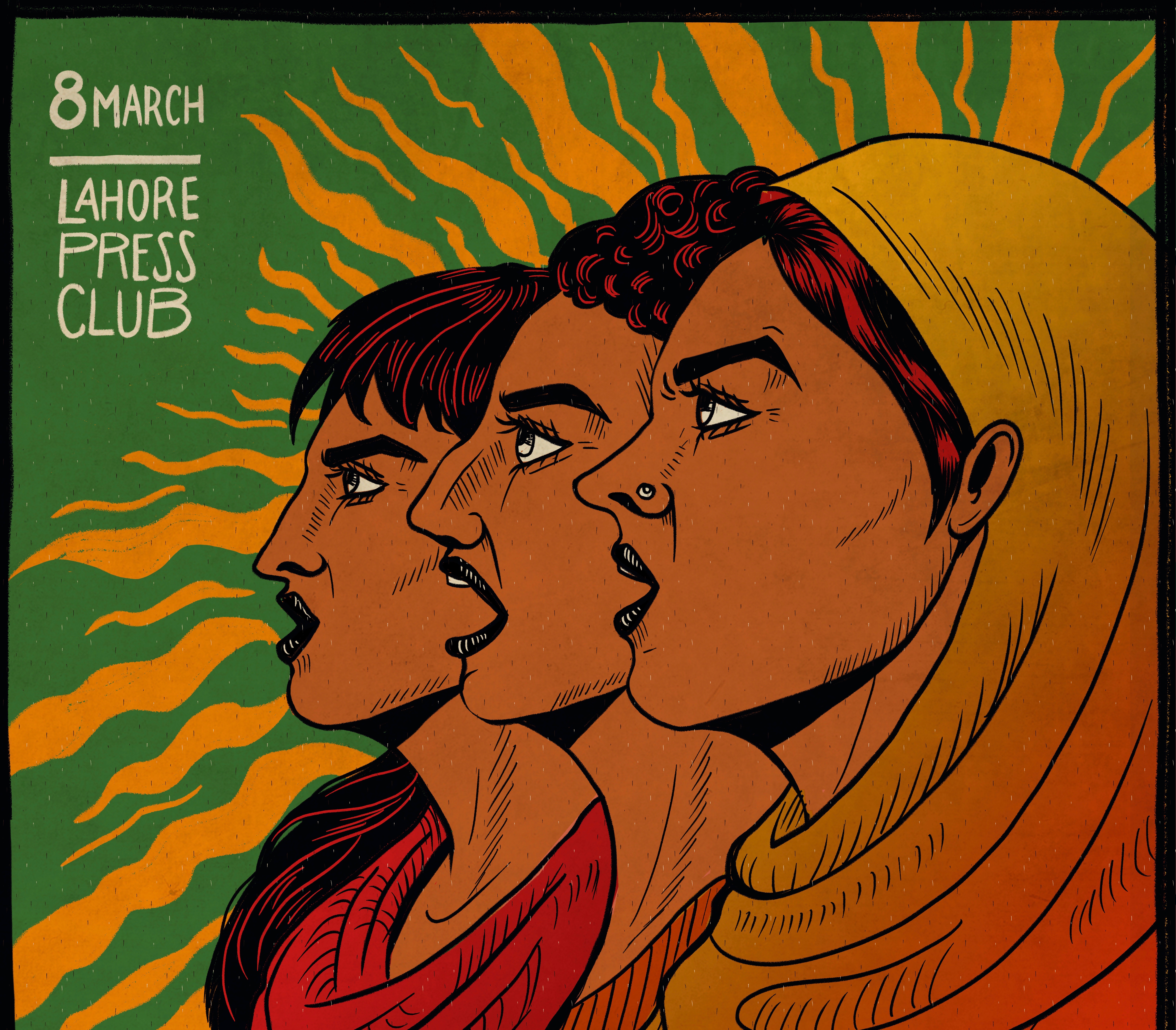
As Pakistani women prepare for the country’s second International Women’s Day March on Friday, this year’s theme of ‘sisterhood and solidarity’ is particularly pertinent to the current political climate. Pakistan and India remain at loggerheads following a suicide bombing in India-administered Kashmir on 14 February, claimed by Pakistan-based militant group Jaish-e-Muhammad.
From political leaders to angry Tweeters, jingoism on both sides is mostly being propagated by men. Women, meanwhile, are discouraged from engaging in a discourse that is considered masculine and beyond what they should be concerned about. But Pakistan’s feminist movement is pushing back against this, adopting an anti-war agenda that attacks militarism from an explicitly anti-capitalist, feminist and postcolonial perspective.
For the past three weeks, the popular press in Pakistan and India has been awash with militaristic nationalism, sometimes in the form of fake news, which is stoking tensions among an already fearful public. Male-dominated crowds have gathered in rallies against their neighbouring state. Online, Twitter has been a critical battleground. Although #SayNoToWar was trending on the social media site in India and Pakistan last week, anti-war activists say violent tweets often drowned out calls for peace, with hashtags including #IndiaStrikesBack and then #PakistanStrikesBack.
“If we look at hashtags related to militarisation, war or politics, we see more men commenting than women,” Nighat Dad, founder of the Digital Rights Foundation and co-organiser of the Lahore Women’s March, told Novara Media. “In a patriarchal society, this discourse is considered masculine.”
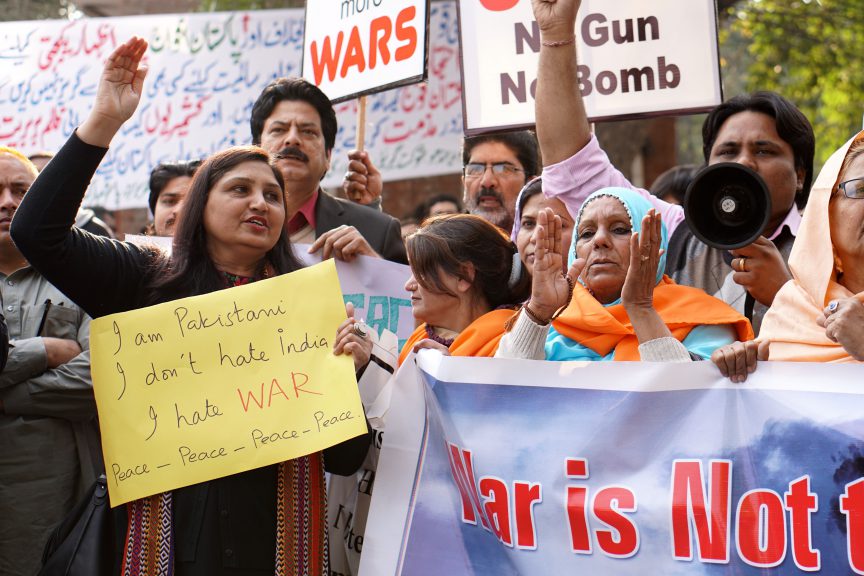
Shmyla Khan, a member of Pakistani feminist collective Girls at Dhabas and another co-organiser of the Lahore March, said women weren’t staying silent because they aren’t interested. “I would not say that women are less susceptible to nationalistic, pro-war narratives,” she said, explaining that instead she believes women are less vocal because the “patriarchal, capitalist structure[s]” behind modern war often leave them out altogether. In actuality, she added, “feminists are more acutely aware of the effects of violence since it is so embedded in the everyday experience of women”.
https://www.instagram.com/p/Bui0ERTnH6d/
In a twelve-point document that includes demands on environmental justice, transgender inclusion and restorative justice, organisers define the march as “a movement towards collective action and consciousness-building”. Central to this is the march as an explicitly anti-war platform.
The manifesto says:
“We believe that war is a business… In the end no one wins except corporations and fascist ideologues. Wars militarise our everyday lives, create fear and fill the public with hatred…We, as feminists, resolved to actively fight against it.”
The document goes on to set out the march’s stance against police brutality and enforced disappearances – both of which escalate with increased military tensions and action.
“In Pakistan and in India, feminists have often been the loudest voices standing up against militarism and religious nationalism,” said sociologist and Women’s March co-organiser Nida Kirmani, “because we know [militarism and nationalism are] often focused on controlling women’s bodies and controlling sexual minorities and anyone who violates the strict rules of patriarchy.”
Since Partition in 1947, citizens of India and Pakistan have faced constant political tensions, frequent conflicts, and four wars – mostly related to Kashmir.
A peace rally held in Lahore on 28 February had women at the helm. “As a citizen who has seen two wars – the 1965 and the 1971 war – one knows exactly what it entails, what it means to have a war,” Tamkinet Karim, a protester in her fifties, told Novara Media.
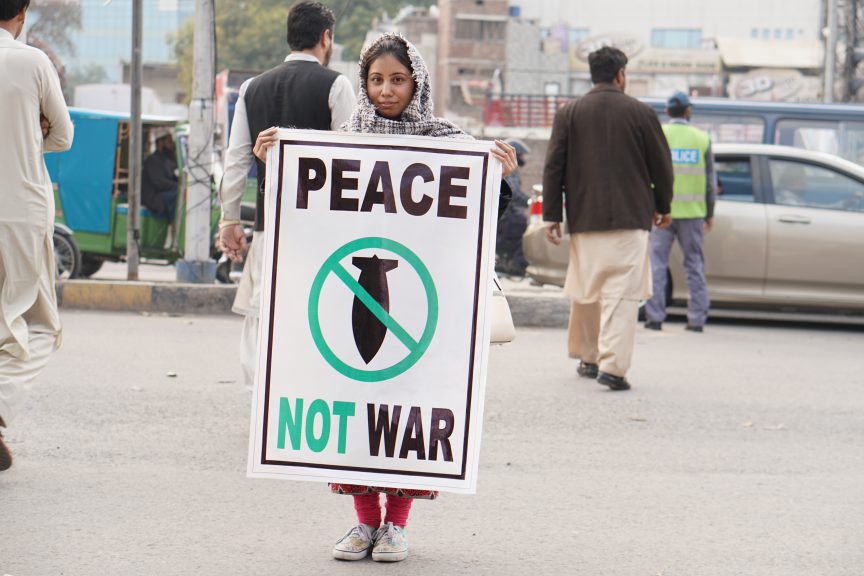
Meanwhile protester Nyla Naz emphasised the importance of solidarity between women in India and Pakistan. “We are the same,” she said, “there is only one line, a border, that separates us.”
A statement released on 1 March by the Asia Pacific Forum on Women, Law and Development calls for peace in the region, laying out the effects of conflict on women in India and Pakistan. It lists:
“sexual violence, enforced disappearance of male family members leaving women-headed households vulnerable and economically insecure, and growing fundamentalism and curtailed civil and political rights leading to abrogation of women’s human rights.”
Prominent women on both sides of the border have been vocal in their calls for peace online. In a tweet shared over 31,000 times, Malala Yousafzai asks prime ministers Imran Khan and Narendra Modi to “settle the current conflict and long-standing issue of Kashmir through dialogue.” Meanwhile, Indian activist and author Arundhati Roy wrote a piece for the Huffington Post condemning “irresponsible nuclear brinkmanship”.
On 27 February, a coalition of Pakistani women involved with the Islamabad Women’s March shared a video – which now has almost 25,000 views – on the #SayNoToWar hashtag, calling upon “our Indian sisters to join hands for peace in the region.”
“We believe that as women of South Asia we have much in common, our everyday struggles with patriarchy are very similar,” said Toobya Syed, a member of the Women’s Democratic Front, an organisation involved with making the video.
“During Partition women on both sides of the border suffered irreparable trauma and pain which was inflicted on their bodies. Women are disproportionately affected in wars hence it’s of utmost important for women to resist this war.”
Syed highlighted the importance of the voices of Kashmiri women – who are usually on the frontlines of militarised violence – in the struggle for peace.
“We salute their resistance” she said.
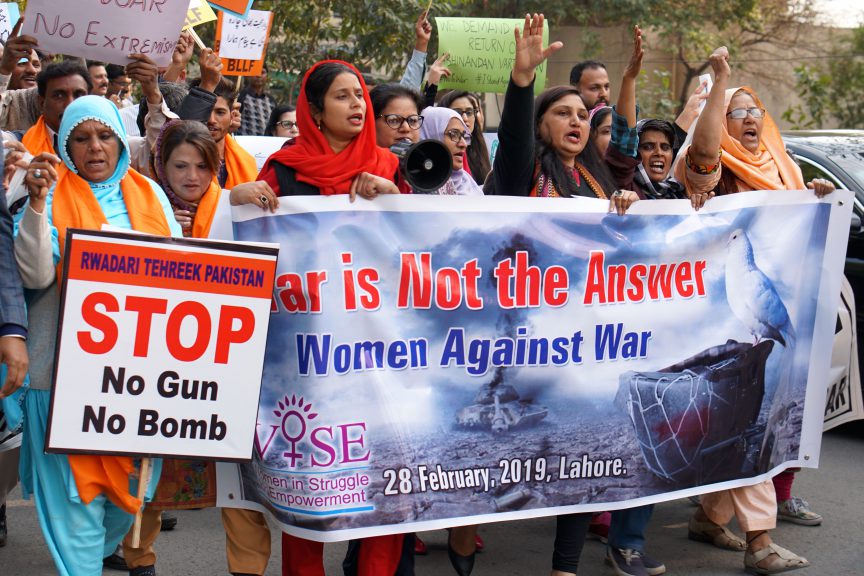
According to the Jammu Kashmir Coalition of Civil Society, 2018 was the deadliest year of the past decade in Indian-administered Kashmir, and sexual violence “as a ‘weapon of war’ continues to be prevalent”.
“India and Pakistan are crowding out the voices of Kashmiri women because they do not fit into the nationalist male power structures, but since the 1930s Kashmiri women have been registering their protests nonetheless,” said Sehar Iqbal, a Kashmiri peace and human rights activist.
According to an anonymous source, the Indian government has cut off internet in Kashmiri villages, meaning Novara Media could not be put in touch with women on the frontlines of violence.
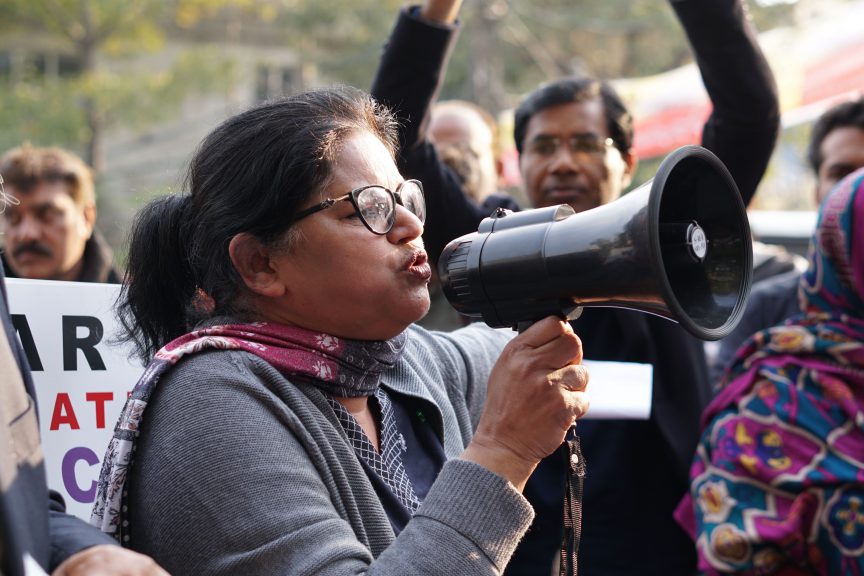
“Being a feminist, I abhor the violence that competing male nationalisms continue to unleash on women in Kashmir and elsewhere,” said Iqbal, stressing the importance of putting “women in the centre of decisions that affect them”.
Co-organiser Leena Ghani summarised the purpose of Friday’s Women’s March. “We are here to show solidarity with all those have been oppressed, marginalised, discriminated against and excluded,” she said.
“We are building a movement.”
Lahore March graphics by Shehzil Malik.